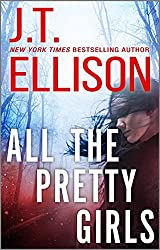All The Pretty Girls by J.T. Ellison

 All The Pretty Girls by J.T. Ellison
All The Pretty Girls by J.T. Ellison
My rating: 2 of 5 stars
Great cover. Interesting premise. Lots of good reviews.
Horrible book.
I hated All The Pretty Girls. Not because it was gory — that didn’t bother me, and in fact, it wasn’t nearly as gory as some previous reviews made it out to be (although the descriptions of maggots were cringeworthy). Not because it was more than a little cliche. Not because it was repetitive, and characters were constantly repeating their discoveries in great detail to other characters and reading those damn poems aloud, over and over (though that was a contributing factor). Not because every other sentence was a run-on (albeit it was a huge distraction…Ever heard of a semicolon, J.T.? Editors? The word “and”?) Not because I was bored for about 85% of the book (though, again, a contributing factor).
No. I hated it because…
Because the characters were so flat and unrealistic it’s downright laughable—and I didn’t give a rat’s patootie about any of them. Tell me if you’ve ever heard of any of these: A hot-shot woman cop who’s the first/youngest/prettiest/most accomplished/female cop who’s ever done (fill in the blank), and has a team of men reporting to her. (Castle, anyone?) A handsome, accomplished FBI agent who takes over cases and irritates local police. (Every cop show ever?) A pretty, young, floofy receptionist who flirts with the handsome, accomplished FBI agent; rolls her eyes at her domineering male boss; and then reveals a deep, dark secret with tears in her eyes seconds later. Bloodthirsty reporters who only care about getting the story and becoming famous, no matter how many people they hurt along the way. Etc. etc. etc.
I could not have cared less for any of them. I felt no chemistry between Taylor and Baldwin, and their ending was something straight out of a romance novel—so out of character that it actually pissed me off. I laughed out loud about the fatal car accident. I lost count of how many times one character would refer to another character by name in the space of one conversation. I rolled my eyes at the fact that Baldwin could immediately name not only the poet but the name of the poem for each and every note the killer left behind. It was completely unbelievable that Betsy was more concerned with how she would look to her fellow detectives if they found out that she’d been raped by a perp than the fact that she had just been violated in one of the most violent and horrifying ways anyone can be violated. And the worst part about the suicide was (view spoiler) how the sheriff described it as “a little accident.” (“Oh, I’m sorry, you can’t talk to him now—he’s blown his brains out—but can I take a message?” Really??)
Because it was full of pointlessness. What was the point of Taylor’s pregnancy scare? (And by the way, I lost what little respect I had for her when she immediately got drunk and smoked a bunch of cigarettes after talking to her doctor.) What was the point of the Rainman? What was the point of DA Page and the drug dealer who bribed a judge? What was the point of spending four pages on the structure of the Nashville Police Department? If you, as an author, don’t have enough of a story to fill an entire novel, then that’s a problem you need to fix by fleshing out the plot—not by adding in a bunch of irrelevant side stories and dumping extraneous information that distract from the main conflict.
Because of how backstories were handled. Taylor hints at a life-threatening incident that happened previously, but we never actually find out what happened. Meanwhile, we learn everything there is to know about characters that are about to be killed off. Which do you think is more important: The reason why the main character almost died not too long ago and how it’s affecting her life today, or the fact that one of the victims is an asthmatic Italian girl?
Because of the endless head hopping. You can’t give one scene to a character and then kill them off. Why bother giving us another perspective and getting the reader to care about that person (or should I say, trying to get her to care) if they’re going to die in the middle of the scene…and then summarize it to another character in the next scene? This is a) repetitive, b) pointless, and c) wasting the time you should be spending showing your readers why they should care about your main characters.
The only reason I gave a second star is because I did want to know the killer’s motivation (not enough to continue reading page by page; I actually skimmed the last quarter of the book), and there was a decent twist at the end. Obviously some people were impressed by this book, based on all the four-star reviews, but I wasn’t one of them. Y’all can keep reading J.T. Ellison; I’m moving on to greener (more exciting, less stereotypical, better edited, twistier) pastures.





